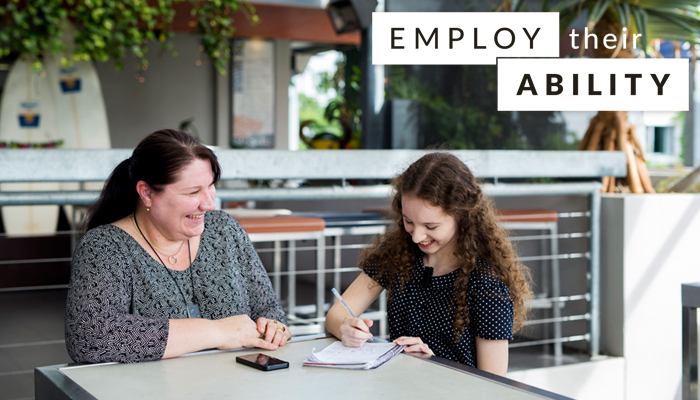CRRS helping the DES – client connection
Photograph of two women sitting at a table. One woman is writing in a notebook (Source: JobAccess)
As with any working relationship, effective communication between a Disability Employment Services (DES) participant and their provider is critical to make progress against plans and ultimately achieve employment success. However, sometimes a DES participant or their employer may have questions or are not sure what to do next. This is when the Complaints Resolution and Referral Service (CRRS) may be able to help…
Over the years, the Australian Government’s Disability Employment Services (or DES) have supported tens of thousands of people with disability to join the workforce. Support can include career advice, employment preparation, resume development and job search, training and ongoing support at work.
Denise* is one of the many Australians currently registered with a DES provider. After acquiring a physical disability, Denise was unable to return to her usual occupation as a Nurse. With a view to establishing a new career, she registered with a local DES provider, and is currently completing a Certificate III in Education Support while receiving the Newstart Allowance.
Denise was unsure as to what she was required to do as a jobseeker and wanted to gain some clarification. As a result, she contacted the Complaints Resolution and Referral Service (CRRS), which forms part of JobAccess, for assistance.
The CRRS is a key part of the Australian Government’s plan to make sure there are good quality services in the disability employment sector, according to Tammy Cesana, Client Support Manager for the CRRS.
“It is a free service for people with disability who are users of DES, Australian Disability Enterprises (ADE) and/or advocacy services, and exists for people with disability to discuss any problem they may have with any of these Australian Government-funded services.
“When we receive a complaint, the CRRS will listen and document the complaint, get permission to talk to the service and any others that are involved, and importantly, remain impartial. We do not take sides or advocate on anyone’s behalf, and therefore can really focus on identifying the right resolution or outcome,” said Tammy.
CRRS team members have an in-depth understanding of Disability Employment Services and a diverse range of qualifications and experiences. 40 percent of staff have a reported disability themselves, and training courses completed by staff members include Mental Health First Aid training, counselling skills, understanding dementia, and Aboriginal and Torres Strait Islander Cultural Competence, ensuring a wide range of complaints can be managed objectively and sensitively.
“The CRRS will either assist the complainant and the service to resolve the complaint together, or we will undertake an investigation, where we contact the service about the complaint, and find out what happened.
“DES providers are required to meet the National Standards for Disability Services, so we will determine if there has been a breach. Based on the outcome of the investigation, we may offer Service Improvement Suggestions. These will often not only benefit those involved with the complaint at hand, but help with service delivery improvement generally,” said Tammy.
When Denise contacted the CRRS, she stated she would like support in paying for her Working with Children and Police checks (common requirements when looking for work). Denise was also keen to learn more about the concept of Mutual Obligations Requirements.
Many DES participants have Mutual Obligation Requirements - things that a participant must do in return for receiving income support payments. In Denise’s case, her Mutual Obligation Requirements were undertaking job search while studying.
CRRS contacted the DES and explained Denise’s questions. As a result, they were able to commence paying for her Working with Children and Police checks, remove the requirement for her to job search while studying and discuss Mutual Obligations with Denise.
“Denise commented that the CRRS was able to address her concerns in a matter of days. She was very happy with our service and the communication and connection with her provider,” said Tammy.
“From our experience, service providers also benefit from the skilful investigations done by the team. By taking an objective and outcome focused approach, we’re able to achieve better resolution of issues, and they also gain useful skills in handling complaints,” said Tammy.
In 2018-2019, the CRRS resolved 93 percent of complaints within 20 business days, using feedback to continually improve Australian Government funded disability employment programs.
*Names have been changed for privacy.
Last updated:

